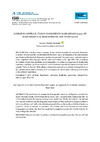Identificador persistente para citar o vincular este elemento:
http://hdl.handle.net/10553/131984
| DC Field | Value | Language |
|---|---|---|
| dc.contributor.author | Martín Cuadrado, Carmen | en_US |
| dc.date.accessioned | 2024-07-01T10:43:03Z | - |
| dc.date.available | 2024-07-01T10:43:03Z | - |
| dc.date.issued | 2024 | en_US |
| dc.identifier.issn | 2386-8635 | en_US |
| dc.identifier.uri | http://hdl.handle.net/10553/131984 | - |
| dc.description.abstract | Este artículo pretende examinar el repertorio lexicográfico de corrección lingüística de Benito Fentanes Lavalle, Combatiendo barbarismos (1937), en búsqueda de las connotaciones que el autor refleja hacia el idioma en su producción personal. Tras presentar el contexto y ciertos datos biográficos sobre el periplo vital del autor en el México de los siglos XIX y XX, se analizan las actitudes lingüísticas percibidas en su compendio y se realiza una propuesta de clasificación siguiendo la tipología que la Gramática de la Real Academia Española incorpora en su obra con el epígrafe “Vicios de dicción”. El fin último es demostrar cómo ciertos repertorios lexicográficos que han quedado desatendidos a lo largo de las investigaciones ofrecen datos valiosos para el estudio de las actitudes lingüísticas. | en_US |
| dc.description.abstract | his article aims to examine the lexicographic repertoire of linguistic correction by Benito Fentanes Lavalle, Combatiendo barbarismos (1937), in search of the connotations that the author reflects toward the language in his personal production. Firstly, the context of the 19th and 20th centuries in Mexico and the biography are presented and then analyzed the linguistic attitudes in his compilation, and finally a classification proposal following the typology of the Real Academia Española, “Vicios de dicción” is presented. The ultimate goal is to demonstrate how certain lexicographic repertoires that have been neglected throughout research offer valuable data for the study of linguistic attitudes. | en_US |
| dc.description.abstract | Cet article vise à examiner le répertoire lexicographique de correction linguistique de Benito Fentanes Lavalle, Combatiendo barbarismos (1937), à la recherche des connotations que l’auteur reflète envers la langue dans sa production personnelle. Après avoir présenté le contexte au Mexique dans XIXe et XXe siècles et certaines données biographiques sur l’auteur, les attitudes linguistiques perçues dans sa compilation sont analysées, et une classification est réalisée suivant la typologie de Real Academia Española, « Vicios de dicción ». L’objectif est de démontrer comment certains répertoires lexicographiques négligés au fil des recherches offrent des données précieuses pour l’étude des attitudes linguistiques. | en_US |
| dc.language | spa | en_US |
| dc.relation.ispartof | Philologica canariensia | en_US |
| dc.source | Philologica canariensia [ISSN 2386-8635], v. 30, p. 353-376, (Junio 2024) | en_US |
| dc.subject | 5705 Lingüística sincrónica | en_US |
| dc.subject.other | Actitudes lingüísticas | en_US |
| dc.subject.other | Corrección lingüística | en_US |
| dc.subject.other | Repertorios lexicográficos | en_US |
| dc.subject.other | México | en_US |
| dc.subject.other | Siglos XIX y XX | en_US |
| dc.subject.other | Linguistic attitudes | en_US |
| dc.subject.other | Linguistic correction | en_US |
| dc.subject.other | Lexicographic repertoires | en_US |
| dc.subject.other | 19th and 20th centuries | en_US |
| dc.subject.other | Attitudes linguistiques | en_US |
| dc.subject.other | Correction linguistique | en_US |
| dc.subject.other | Répertoires lexicographiques | en_US |
| dc.subject.other | Mexique | en_US |
| dc.subject.other | XIXe et XXe siècles | en_US |
| dc.title | Luchando contra el vicio o Combatiendo barbarismos (1937): un acercamiento al repertorio de Benito Fentanes | en_US |
| dc.title.alternative | Fighting Vice or Combatiendo barbarismos (1937): An Approach to the Benito Fentanes’s Repertoire | en_US |
| dc.title.alternative | Lutter contre le vice ou Combatiendo barbarismos (1937) : une aproche du répertoire de Benito Fentanes | en_US |
| dc.type | info:eu-repo/semantics/article | en_US |
| dc.type | Article | en_US |
| dc.identifier.doi | 10.20420/Phil.Can.2024.681 | en_US |
| dc.description.lastpage | 376 | en_US |
| dc.description.firstpage | 353 | en_US |
| dc.relation.volume | 30 | en_US |
| dc.investigacion | Artes y Humanidades | en_US |
| dc.type2 | Artículo | en_US |
| dc.description.numberofpages | 24 | en_US |
| dc.utils.revision | Sí | en_US |
| dc.date.coverdate | Junio 2024 | en_US |
| dc.identifier.ulpgc | No | en_US |
| dc.contributor.buulpgc | BU-HUM | en_US |
| dc.description.sjr | 0,173 | |
| dc.description.sjrq | Q1 | |
| dc.description.esci | ESCI | |
| dc.description.fecytq | Q2 | |
| dc.description.fecytpuntuacion | 32,07 | |
| dc.description.dialnetimpact | 0,0 | |
| dc.description.dialnetq | Q1 | |
| dc.description.miaricds | 9,9 | |
| dc.description.erihplus | ERIH PLUS | |
| item.fulltext | Con texto completo | - |
| item.grantfulltext | open | - |
| Appears in Collections: | Artículos | |
Page view(s)
52
checked on Jan 25, 2025
Download(s)
224
checked on Jan 25, 2025
Google ScholarTM
Check
Altmetric
Share
Export metadata
Items in accedaCRIS are protected by copyright, with all rights reserved, unless otherwise indicated.
